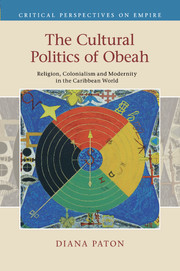Book contents
- The Cultural Politics of Obeah
- Critical Perspectives on Empire
- The Cultural Politics of Obeah
- Copyright page
- Dedication
- Contents
- Figures
- Tables
- Book part
- Glossary
- Introduction
- 1 The emergence of Caribbean spiritual politics
- 2 Obeahand the slave-trade debates
- 3 Creole slave society, obeah, and the law
- 4 Obeah and its meanings in the post-emancipation era
- 5 Obeah in the courts, 1890–1939
- 6 Obeah prosecutions from the inside
- 7 Protest, development, and the politics of obeah
- 8 The post-colonial politics of obeah
- Conclusion
- Bibliography
- Index
- References
Bibliography
Published online by Cambridge University Press: 05 August 2015
- The Cultural Politics of Obeah
- Critical Perspectives on Empire
- The Cultural Politics of Obeah
- Copyright page
- Dedication
- Contents
- Figures
- Tables
- Book part
- Glossary
- Introduction
- 1 The emergence of Caribbean spiritual politics
- 2 Obeahand the slave-trade debates
- 3 Creole slave society, obeah, and the law
- 4 Obeah and its meanings in the post-emancipation era
- 5 Obeah in the courts, 1890–1939
- 6 Obeah prosecutions from the inside
- 7 Protest, development, and the politics of obeah
- 8 The post-colonial politics of obeah
- Conclusion
- Bibliography
- Index
- References
- Type
- Chapter
- Information
- The Cultural Politics of ObeahReligion, Colonialism and Modernity in the Caribbean World, pp. 317 - 346Publisher: Cambridge University PressPrint publication year: 2015

